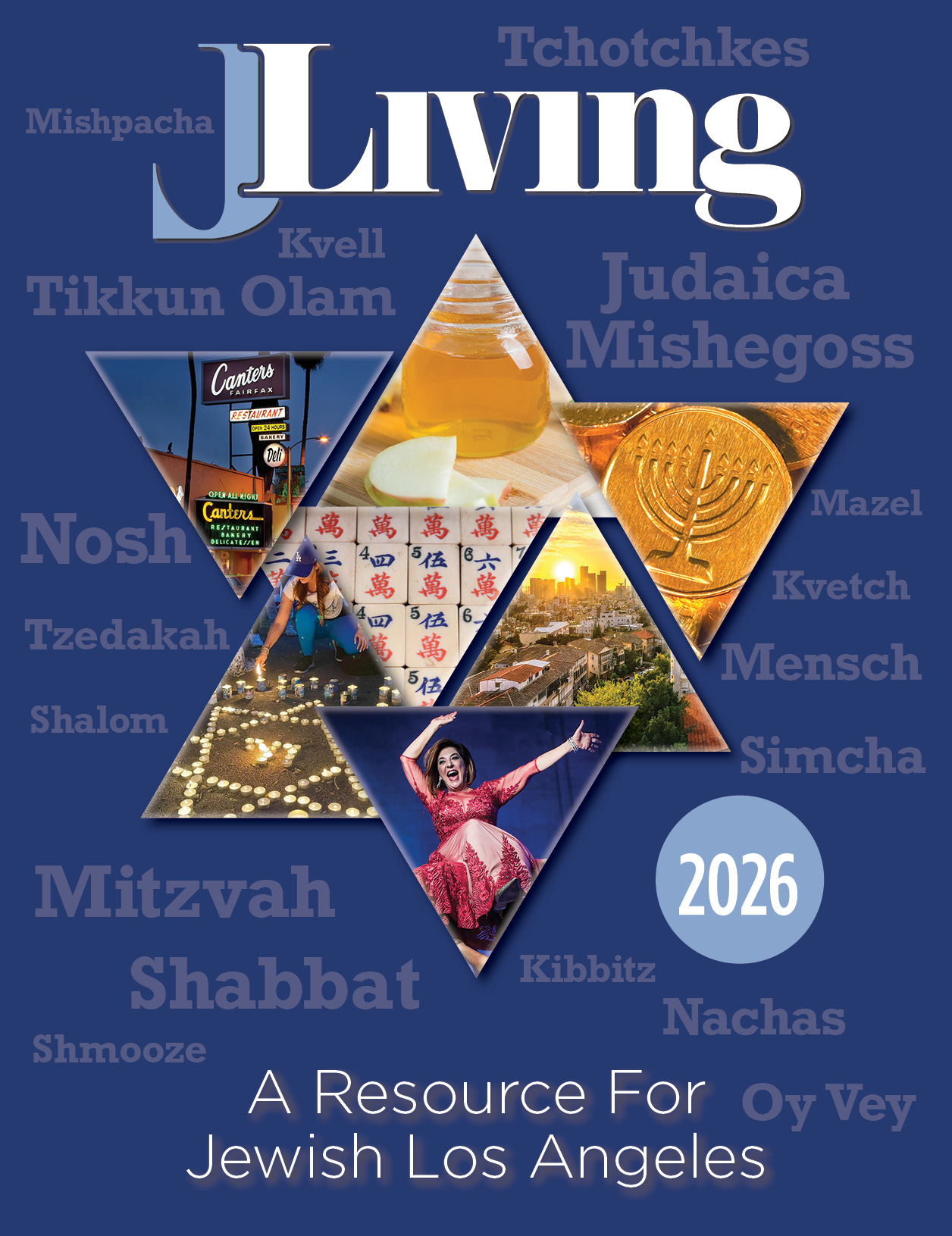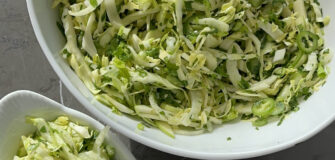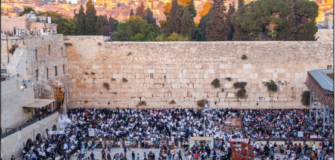Food Mitzvah Projects
– By Debra Eckerling
As Jewish youth prepare for their b’nai mitzvah celebrations, they take on a mitzvah project. A mitzvah project is typically some sort of community service initiative that demonstrates their understanding of Jewish values.
While the options for service are endless and range from caring for others to social action, there is something extra significant about the food mitzvah. You nourish your soul through raising money and awareness, gathering food, and cooking or baking to feed others.
JLiving spoke with Liz Braun-Lilenfeld, Director of Outreach at MAZON: A Jewish Response to Hunger; Samantha Teslik, Director of Community Programs at Food Forward; and Chaya Segelman, co-founder and Program Director for Our Big Kitchen LA, about their food mitzvah programs, as well as their thoughts on the food mitzvah connection.
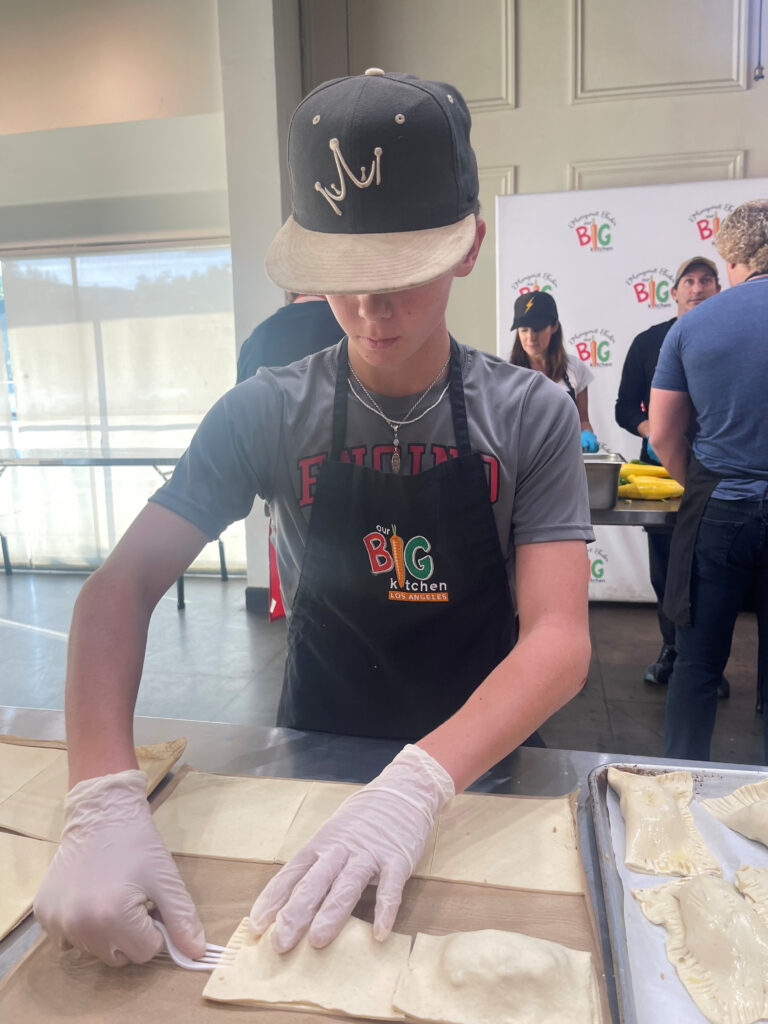
MAZON
MAZON: A Jewish Response to Hunger is a national advocacy group working to end hunger among people of all faiths and backgrounds in the United States and Israel. Embodying the ideals of Tikkun Olam (repair the world) and B’Tzelem Elohim (we’re all made in the divine image), MAZON educates the Jewish community about the reality of the hunger crisis, how to get involved in trying to end it, and ways to protect those who are most vulnerable.
On its website, MAZON shares numerous ways for creating a mitzvah project around and encompassing its work.
Advocacy ideas include:
- Submitting an article to your school newspaper about hunger and what students can do to address the issue
- Writing a short story about hunger
- Filming a video about the prevalence of hunger
- Hosting a hunger seder for Passover
- On or before the day of your Bar or Bat Mitzvah, having friends and family write messages on paper plates explaining why we should fight hunger, and then sending the plates to local, state or federal political leaders as a plea to take action
Tzedakah ideas include:
- Starting an awareness campaign related to a specific topic about hunger — such as nutritional obstacles faced by hungry people — and raising money for it
- Organizing a “Walk to End Hunger” or other “Hunger Awareness Day”
- Volunteering your time at or organizing a food drive for a local pantry
- Donating a percentage of the cost of your b’nai mitzvah to MAZON
- Encouraging guests to donate to MAZON in lieu of presents
MAZON offers materials and resources to support any of these projects.
What is it about food that makes a mitzvah project even more special?
Food is deeply ingrained in our identity, as Jews and as people. The smell of the brisket or doro wat or fesenjan that makes you know you’re in your grandparents’ kitchen, or the charoset that connects you to countless generations before you. We all deserve, each of us, to have these foods that feed our bellies and our souls and make us us.
We know, deeply, that food is more than just calories on a plate. That’s why part of fighting for people to eat with dignity means fighting to allow them to eat in a way that reflects the fullness of their being. And so when we work to support programs like SNAP, the nation’s largest program to address hunger and food insecurity, we want to protect and strengthen it, so it’s the most generous program it can possibly be. And to do this work as a b’nai mitzvah is to bring together the responsibility of carrying our identity through food and the right for others to do the same.
What started this mitzvah initiative? Has it always been part of the program?
MAZON was born out of simcha celebrations! Forty years ago, our founders looked at the incredible celebrations that we hold as a community, like b’nai mitzvot, and felt deeply that we should make space for the most vulnerable among us in those moments. As we celebrate milestones and feed our guests in joy, we should donate to make sure everyone is fed in justice. Many people still remember MAZON fondly from those early years of our founding precisely because they made MAZON part of their b’nai mitzvah.
What value do the kids and families get from the experience?
We look at the work we do with students as skill building. We would be delighted and honored if fighting hunger became the cause of our students’ lives, but we know that the students we work with are passionate about a great many things, as they should be. And so to work with us, in your classroom or from the bimah, is to learn how to be an advocate. How to learn about a cause, how to convince others that it is meaningful, and how to look to our tradition to find moving and essential support for these efforts. And hunger itself is part of so many issues of our day that inspire and drive our students — issues of poverty, queer rights, women’s rights, disability justice, and more. We can only hope students and families walk away from working with us with the tools to be changemakers.
Is there a particular food that people typically associate with food-related mitzvah projects?
Challah is a staple of our traditions, the most wonderful smell in the oven, and the best tool to begin a mitzvah project. Through our program Challah for Hunger, you can bake challah, sell it to your community (at school, to your family, in your neighborhood, and beyond), and donate the funds to anti-hunger work. What’s not to like!
Learn more at MAZON.org and/or reach out to outreach@mazon.org.
While the options for service are endless and range from caring for others to social action, there is something extra significant about the food mitzvah. You nourish your soul through raising money and awareness, gathering food, and cooking or baking to feed others.
JLiving spoke with Liz Braun-Lilenfeld, Director of Outreach at MAZON: A Jewish Response to Hunger; Samantha Teslik, Director of Community Programs at Food Forward; and Chaya Segelman, co-founder and Program Director for Our Big Kitchen LA, about their food mitzvah programs, as well as their thoughts on the food mitzvah connection.
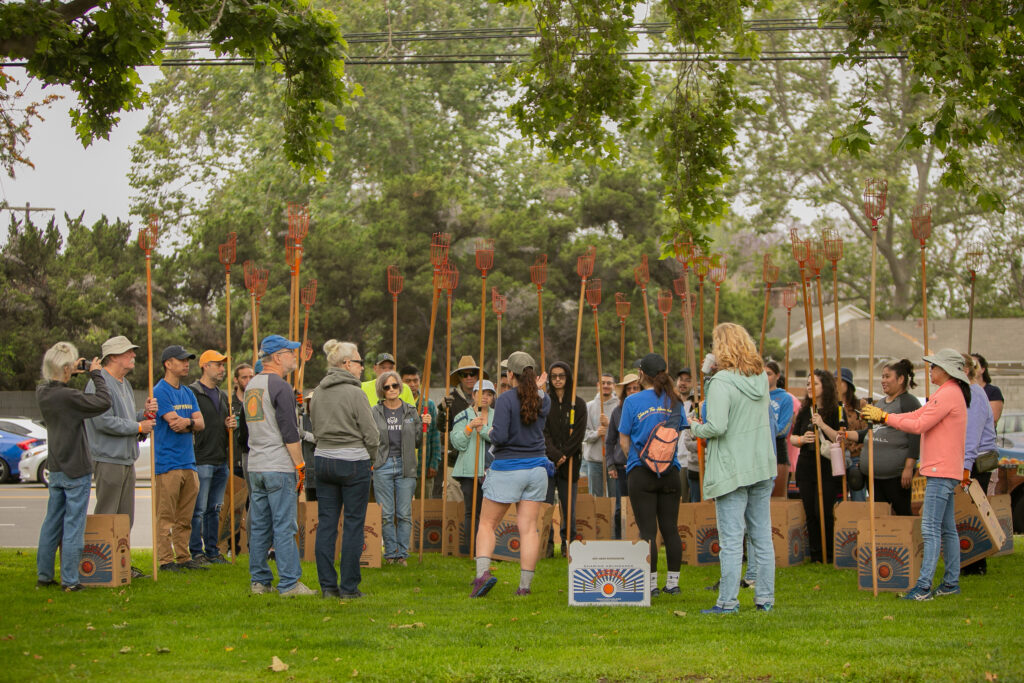
Food Forward
Food Forward is a nonprofit organization that brings fresh surplus fruits and vegetables, free of charge, to people experiencing food insecurity. Since 2009, Food Forward has been on a mission to fight hunger and reduce food waste. Every week, Food Forward rescues and shares nearly two million pounds of fresh produce with families and individuals in need. This summer marks a huge milestone, as Food Forward surpasses the 500-million-pound mark!
Food Forward’s dedicated team members and volunteers recover fresh fruits and vegetables that would have been wasted from backyard fruit trees, public orchards, farmers markets and the downtown Los Angeles Wholesale Produce Market. They connect this abundance of nutritious food to people experiencing food insecurity, donating 100% of the produce recovered to hunger relief agencies across 13 California counties that include Los Angeles and Ventura, along with seven adjacent states and tribal lands.
There are several ways for Jewish youth to support the efforts of Food Forward as part of their mitzvah projects. At the heart of Food Forward is the incredible work of volunteers who graciously give of their time to help harvest fresh fruits and vegetables to be shared with those in need. Those interested can sign up to participate at an upcoming harvest event held at various orchards throughout Southern California. Another opportunity is to help out at local farmers’ markets, collecting produce from vendors with whom they have relationships.
Any financial donation is greatly appreciated, so another option is to raise money to donate to the organization. You can even help Food Forward by shopping at its online store for a Food Forward T-shirt or hat, which provides both financial support and helps to raise awareness. Food Forward works hard to stretch the impact of every penny by keeping its operating costs to just eight cents per pound of produce rescued and redistributed to those in need.
What is it about food that makes a mitzvah project even more special?
What better way to help our communities than to ensure everyone has access to the nutrient-rich fruits and vegetables we need to remain healthy? That’s what Food Forward does every day. With one in four Angelenos suffering from food insecurity, the need has never been greater. For many, fresh produce is plentiful, while for others it’s out of reach. Food Forward works to bridge that gap — placing delicious fresh produce within reach for millions who would otherwise go without.
What started this initiative? What makes Food Forward special?
Food Forward was founded on the idea of sharing what we have with others, helping to prevent waste, and promoting accessibility and nutrition. It’s a simple concept with tremendous impact on hundreds of thousands of families and individuals in our communities every day.
What value do the kids and families get from the experience?
Volunteering at a harvest creates a real connection between the food we eat and its source. For many, the only time they touch produce is at the supermarket. A harvest not only educates us on where our food comes from but gives us a greater connection to our planet and the nutrition it’s able to provide.
Learn about volunteer opportunities, donating, and the Food Forward shop at FoodForward.org.
Our Big Kitchen Los Angeles
OBKLA is a community-run, non-denominational kitchen, where, during two-hour sessions, volunteers prepare and pack hot, kosher meals for those in need throughout Los Angeles. Also known as Margaret Feder Our Big Kitchen, OBKLA believes that food is more than nourishment — it’s connection, dignity, and love. This act of generosity feeds body and soul.
“For all three of our sons’ bar mitzvahs — starting in 2021 and going through 2025, they gathered friends at OBKLA to cook and package meals for those facing food insecurity,” explains mother and volunteer Melissa Hirsch. “To us, OBKLA, under Yossi and Chaya’s leadership, has become a cornerstone for meaningful service in Los Angeles, bringing our friends and family together through acts of giving.”
B’nai mitzvah students of all backgrounds are welcome to join OBKLA for several volunteer visits leading up to their special day, immersing themselves in service and in the organization’s mission to feed those facing food insecurity.
As its celebration approaches, OBKLA offers a personal meeting to help participants craft a meaningful message for their speech, sharing reflections on their impact and journey.
In addition, OBKLA provides the option to host a private volunteer session for family and friends — either before the big day or as part of the celebration weekend — to prepare hundreds of meals together in honor of the special occasion. And for those wishing to extend the experience, immediately following the volunteer session, the space can be transformed to celebrate with music, food and drinks.
What is it about food that makes a mitzvah project even more special?
There’s something deeply sacred about feeding others. Jewish tradition elevates the act of providing food to someone in need as one of the highest forms of kindness — a mitzvah that nourishes both the giver and the receiver. For kids stepping into Jewish adulthood, cooking and packaging meals for those in need helps them to understand what it truly means to take responsibility for the world around them.
What started this mitzvah initiative? Has it always been part of the program?
The OBKLA Mitzvah Project grew naturally from our weekly meal production. Families would come to volunteer and ask how their children could take part in a more personal, impactful way. We realized: what better way to mark a Bar or Bat Mitzvah than with chesed (loving-kindness) in action? Now, it’s a cherished part of our mission and one of the most requested service opportunities.
What value do the kids and families get from the experience?
Kids often arrive expecting to help, but leave transformed. They see the scale of the need in their own city. They smell the food baking, feel the joy in shaping something with their hands, and learn that small acts — scooping dough, sealing a box — can ripple out and change lives. Families often tell us it was one of the most meaningful parts of their celebration. It gives the milestone more depth, anchoring it in values, not just festivities.
Is there a particular food that people typically associate with food-related mitzvah projects?
One of the most beloved treats made during our mitzvah sessions is the OBKLA chocolate chip cookie. These cookies bring joy and comfort to those who receive them — baked with heart, wrapped with care and shared with love. The recipe, featured on our Instagram, is listed below, so you can try it yourself.
The Margaret Feder Our Big Kitchen LA is located at 8657 W. Pico Blvd. in Los Angeles. Learn more at OBKLA.org.
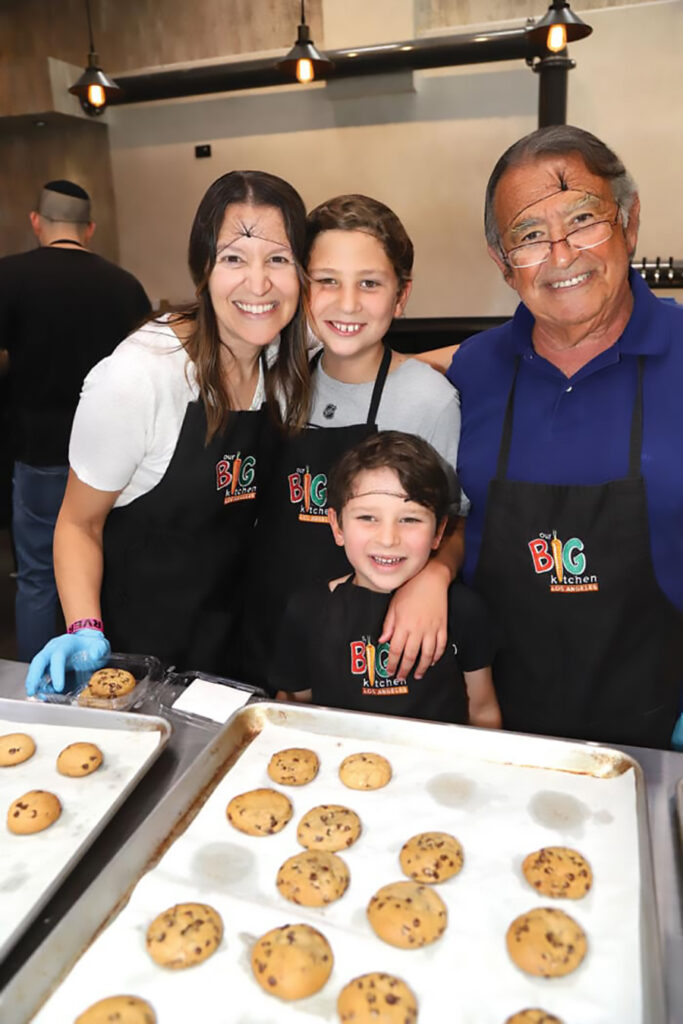
OBKLA Chocolate Chip Cookies
Ingredients
2 sticks (1 cup) unsalted margarine or vegan butter, softened
1 cup brown sugar
1/2 cup white sugar
2 eggs
1 tsp vanilla extract
2 1/4 cups all-purpose flour
1 tsp baking soda
1/2 tsp salt
2 cups semisweet chocolate chips
Directions
- Preheat the oven to 350°F.
- Cream together the margarine and sugars until fluffy.
- Beat in eggs one at a time, then add vanilla.
- In a separate bowl, whisk flour, baking soda and salt.
- Gradually mix the dry ingredients into the wet mixture.
- Fold in the chocolate chips.
- Scoop dough onto parchment-lined baking sheets.
- Bake for 10-12 minutes or until lightly golden.
- Let cool slightly … and try not to eat them all before sharing!

